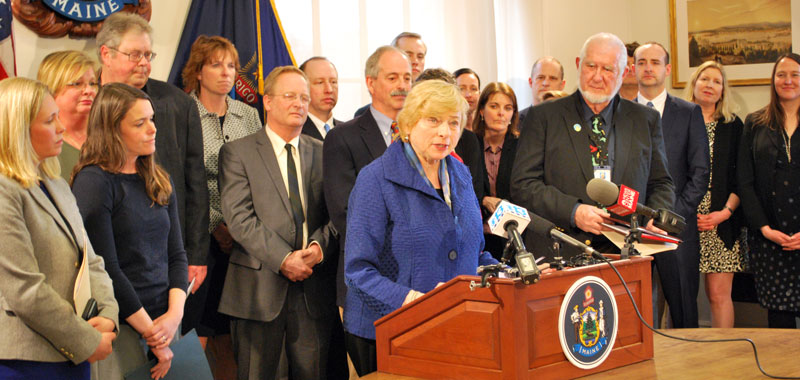Governor Janet Mills announced today that she has introduced bipartisan legislation to create the Maine Climate Council. The Climate Council will develop the action plan and timetable to meet the state’s greenhouse gas reduction goals, to promote jobs and economic benefits for Maine people in the transition to a lower carbon economy, and to support the climate resiliency of Maine’s communities.
“Evidence continues to mount that the impacts of climate change are harming our state and nation. Even the administration in Washington has joined the chorus of concerned scientists as the EPA last week warned,” said Governor Mills. “Today, we take another step in combating this threat, expanding our clean energy economy, and investing in our future by creating the Maine Climate Council and marshaling experts across the state to take urgent action. I look forward to working with the Legislature to pass this bill and ensure that the Climate Council can begin its work on building a better, brighter future for our state.”
The Federal Environmental Protection Agency published a 150-page document (PDF) last week issuing climate change preparedness guidance for communities nationwide already struggling with severe natural disasters. The report acknowledged that climate change “is expected to increase the frequency and intensity of some natural disasters.”
Governor Mills was joined for the announcement by Republican Senator David Woodsome, the lead sponsor of the bill, as well as Bill Mook, owner of Mook Sea Farms in Wallpole, and Melissa Law, owner of Bumbleroot Farmers in Windham, both of whom spoke about the impact that climate change is having on their businesses. Clean energy and environmental advocates, several key commissioners, and other lawmakers also flanked the governor during the press conference.
“I am honored that the Governor has asked me help her with this effort. We may not agree on everything, but I think this something people across Maine and the country need to work on together,” said Senator David Woodsome (R-York), the primary sponsor of the legislation. “In my time in Augusta I’ve worked to encourage renewable energy jobs and I believe we need to do much more on weatherization. I believe this Council and its work can encourage the creation of new jobs for our state and help Maine homeowners.”
“Climate change threatens the future of Maine’s seafood industry and our coastal communities,” said Bill Mook, owner of Mook Sea Farm in Wallpole. “The governor’s bill is a crucial first step on a path that leads to dramatically lower carbon emissions, new economic opportunities, and avoids the worst of the forecasted climate scenarios for the sake of our children and their children.”
“Every industry of Maine’s economy will be impacted by climate change, and the state must develop strategies to prepare for its consequences,” said Melissa Law, owner of Bumbleroot Farms in Windham. “In the agricultural sector, sustainable farming practices can help sequester carbon while simultaneously creating strong local food systems. The future of Maine’s food systems depends on the adaptability and resilience of farms in the face of changing weather patterns and more extreme growing conditions.”
The introduction of the legislation drew praise from the Maine Conservation Voters, Maine Renewable Energy Association, the Nature Conservancy in Maine, the Island Institute, Bigelow Laboratory for Ocean Sciences, the Margaret Chase Smith Policy Center, and the University of Maine’s Climate Change Institute. To read their comments, see the attached document.
read more


